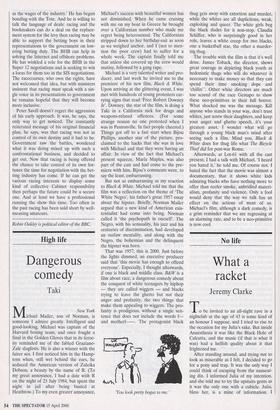High life
Dangerous comedy
Taki
Michael's success with beautiful women has not diminished When he came cruising with me on my boat in Greece he brought over a Californian number who made me regret being heterosexual. The Californian stripped down to her birthday-suit as soon as we weighed anchor, and I (not to men- tion the poor crew) had to suffer for a whole week. The captain finally told me that unless she covered up the crew would mutiny, followed by a gang rape.
Michael is a very talented writer and pro- ducer, and last week he invited me to the premiere of his new film, Black & White. Upon arriving at the glittering event, I was met with hundreds of young protesters car- rying signs that read 'Free Robert Downey Jr'. Downey, the star of the film, is doing a Taki in a California nick for drugs and weapons-related offences. (For some strange reason no one protested when I was in Pentonville. In fact people cheered.) Things got off to a fast start when Bijou Phillips, another star of the picture, pro- claimed to the hacks that she was in love with Michael and that they were having an affair. In view of the fact that Michael's present squeeze, Marla Maples, was also part of the cast and had come to the pre- miere with him, Bijou's comments were, to say the least, embarrassing.
But not as embarrassing as my reaction to Black & White. Michael told me that the film was a reflection on the theme of 'The White Negro', his father's great 1957 essay about the hipster. Briefly, Norman Mailer argued that a new kind of American exis- tentialist had come into being. Norman called it 'the psychopath in oneself'. The Negro, with his sensuality, his jazz and his centuries of discrimination, had developed an outlaw mentality, and along with the Negro, the bohemian and the delinquent the hipster was born.
That was 1957, this is 2000. Just before the lights dimmed, an executive producer said that 'this movie has enough to offend everyone'. Especially, I thought afterwards, if one is black and middle class. B&W is a film about race, a dangerous comedy about the conquest of white teenagers by hiphop — they are called wiggers — and blacks trying to leave the ghetto but not their anger and profanity, the two things that make them appealing to wiggers. The pro- fanity is prodigious, without a single sen- tence that does not include the words 1— and motherf—. The protagonist black 'You look pretty bogus to me.' thug gets away with extortion and murder, while the whites are all duplicitous, weak, exploiting and queer. The white girls beg the black dudes for it non-stop. Claudia Schiffer, who is surprisingly good in her role, leaves a white creep for two blacks, one a basketball star, the other a murder- ing thug.
The trouble with the film is that it's well done. James Toback, the director, shows great courage in depicting black youth as hedonistic thugs who will do whatever is necessary to make money so that they can spend their time smoking dope and `chillin". Other white directors are much too scared of the race Gestapo to show these neo-primitives in their full horror. What shocked me was the message. Kill anyone who stands in your way, don't trust whites, just screw their daughters, and keep your anger and ghetto speech, it's your greatest asset. I wonder what will go through a young black man's mind after seeing such a film. Mind you, Black & White does for thug life what The Bicycle Thief did for post-war Rome.
Afterwards, at Lot-61 with all the cast present, I had a talk with Michael. 'I heard you hated it,' he told me. Of course not. I hated the fact that the movie was almost a documentary, that it shows white kids admiring blacks who have nothing more to offer than reefer smoke, unbridled materi- alism, profanity and violence. Only a fool would deny that the way we talk has an effect on the actions of most of us. Michael's film, although a dark comedy, is a grim reminder that we are regressing at an alarming rate, and to be a neo-primitive is now cool.


































































 Previous page
Previous page